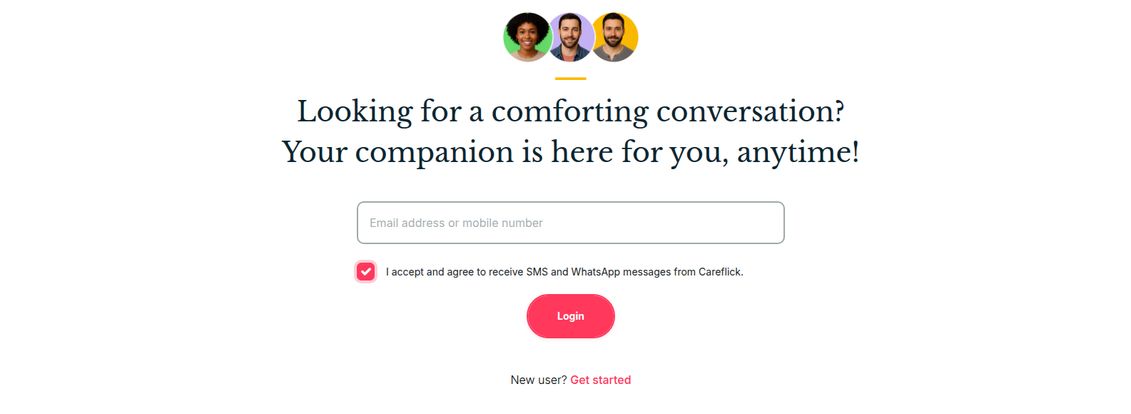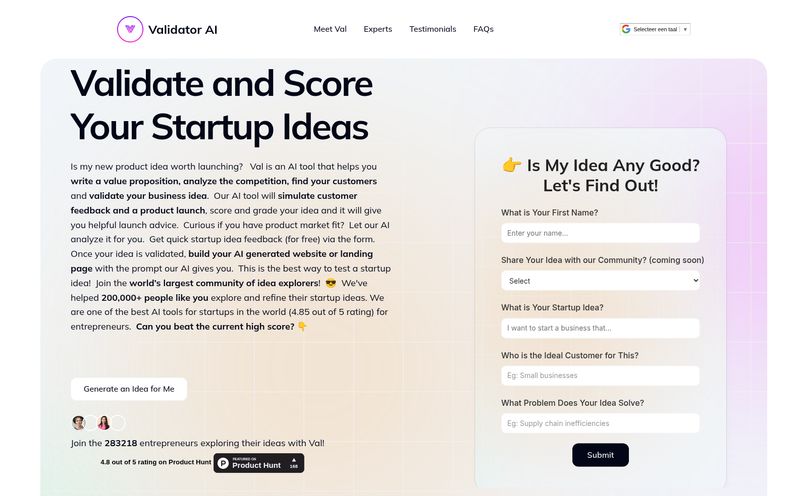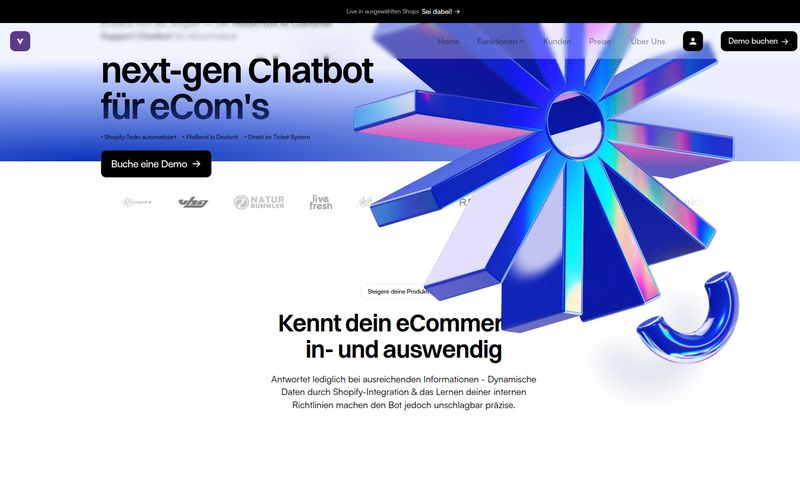In all my years fiddling with SEO, chasing traffic trends, and watching the digital world morph, I've seen a lot of… fluff. A whole lot of it. We've been promised revolutions in a thousand different bottles, especially since the AI boom really kicked into high gear. Every other startup has a new AI to write your emails, design your logos, or optimize your ad spend. And that’s all fine and good. Useful, even.
But sometimes it all feels a bit… cold. Productive, but soulless. It’s all about doing more, faster. Not about feeling better.
So, when I stumbled upon a little platform from a company called Careflick, my interest was piqued. The landing page didn’t promise to 10x my ROI or automate my workflow. It asked a simple question: "Looking for a comforting conversation?" The tool is called Yana. And I think it’s trying to do something profoundly different.
What Exactly is Yana?
At its core, Yana is an AI companion designed for personalized caregiving. It’s not trying to be a doctor or a search engine. It’s positioned as a friend, a confidant, an empathetic ear available 24/7. It's built on a foundation of providing advice, insights, and companionship for people who might be feeling the immense weight of caring for someone else, or perhaps just need someone to talk to themselves.
The name itself, Yana, is an acronym that hits you right in the feels: You Are Not Alone.
And really, isn't that a message we all need to hear sometimes? In an industry obsessed with metrics and conversions, seeing a product lead with a message of pure human connection is, frankly, refreshing. It’s a bold mission statement for a piece of software.

Visit Yana
More Than Just a Chatbot: The Core Features
Okay, so the mission is admirable. But what does Yana actually do? I’ve seen enough chatbots to know they can range from surprisingly helpful to infuriatingly dumb. Based on what Careflick is putting out there, Yana's abilities are built around three key pillars.
Personalized Support When You Need It
Caregiving isn't a one-size-fits-all job. The challenges of caring for an elderly parent with dementia are wildly different from supporting a child with a chronic illness. The promise here is that Yana learns and adapts to your specific situation. It's not just spitting out generic advice from a database. It aims to provide support that's actually relevant to you, your life, right now.
AI-Powered Advice and Insights
This is where the "AI" part really comes into play. Beyond just being a passive listener, Yana is designed to offer actionable advice and insights. Think of it as a partner that can help you spot patterns, suggest coping strategies, or provide information to help you navigate complex caregiving scenarios. The idea of an AI helping you connect the dots when you're too exhausted to see the big picture is... pretty compelling.
A Focus on Empathetic Companionship
This is the secret sauce, the thing that could make Yana special. It’s all about empathy. We're not talking about an AI that can just recognize keywords like "sad" or "stressed." The goal is for a deeper, more meaningful interaction. It's being built to be a digital shoulder to lean on. A non-judgmental space where you can vent your frustrations, share your small wins, or just not feel so isolated at 3 AM when the weight of the world is on your shoulders. A tough thing to engineer, but a worthy goal.
The Human Touch in a Digital World (My Take)
I have to admit, I’m a bit of a hopeful skeptic. My first reaction to most new tech is 'prove it.' But I see the incredible potential here. The number of unpaid family caregivers is staggering—the AARP and National Alliance for Caregiving reported over 53 million in the U.S. alone a few years back. These are people who are often overworked, under-supported, and emotionally drained.
An always-on companion that requires no emotional labor in return? That could be a lifeline. It doesn't get tired. It doesn't judge you for feeling angry or resentful one day. It’s just… there. For people in rural areas, or those with packed schedules who can’t make it to a support group, a tool like Yana could fill a critical gap.
Let's Be Real: The Potential Downsides
Now for the other side of the coin. No tool is perfect, and we have to talk about the obvious limitations. The biggest one is right there in the name: Artificial Intelligence.
Some might argue, and rightly so, that an AI can never, ever replace genuine human connection. And I agree. It shouldn't try to. The danger is when people start using it as a substitute rather than a supplement. Yana’s success hinges on whether it can truly understand the nuance of human emotion or if its 'empathy' is just a cleverly programmed script. If it misunderstands a critical plea for help or gives generic, unhelpful advice at the wrong moment, it could do more harm than good.
It's effectiveness is entirely dependent on how well the AI is trained and how sophisticated its models are. A great idea with poor execution is just a disappointment waiting to happen.
Who Is Yana Really For?
So, who’s the target audience here? I see a few clear groups:
- Family Caregivers: This is the obvious one. The sons, daughters, spouses, and parents who are in the thick of it every single day.
- Individuals Experiencing Loneliness: You don't have to be a caregiver to feel isolated. Yana could be a first step for anyone who needs a comforting presence.
- People Navigating Health Challenges: Managing your own health journey can be an incredibly lonely road. Having a companion to track progress and offer encouragement could be fantastic.
- Those Hesitant About Therapy: For some, talking to a human therapist is a daunting step. An AI could serve as a bridge, a safe space to get comfortable with opening up before seeking professional human help.
What's the Cost of Companionship?
Here’s the million-dollar question. What does it cost? As of right now, I couldn’t find any public pricing information. The platform seems to be very new, perhaps in a beta testing phase. I even hit a '404 not found' page when trying to dig around, which suggests the digital paint is still drying on the walls at Careflick. That’s not uncommon for a new service.
My guess? We’ll likely see a freemium model. A certain number of conversations or basic features for free, with a subscription unlocking more advanced, personalized support. Or, it could be entirely free for a while as they gather data and refine the AI. I’ll be keeping a close eye on this.
Final Thoughts: A Glimmer of Hope in a Lonely World?
So what’s the verdict? I’m cautiously optimistic. Yana is not the solution to the caregiving crisis or the epidemic of loneliness. Let’s be clear about that. It will not replace a hug from a friend, a call with a sibling, or the professional guidance of a therapist.
But maybe it doesn’t have to. Maybe, just maybe, it can be a valuable tool in the mental wellness toolkit. A first line of defense against despair. A small, accessible comfort in a world that often feels overwhelming.
If Yana can deliver on even half of its promise—to make just a few people feel a little less alone—then I'd say that’s a pretty significant achievement for a bunch of code. It’s a step in a direction I’d like to see more tech companies take: one that prioritizes people over productivity. And for that, I’m rooting for them.
Frequently Asked Questions about Yana
- What is Yana?
- Yana is an AI-powered companion from the company Careflick, designed to provide personalized caregiving support, advice, and empathetic conversation to those who need it.
- What does Yana stand for?
- Yana is an acronym for "You Are Not Alone," which reflects its core mission of providing companionship and support.
- How does Yana provide support?
- It uses artificial intelligence to offer personalized advice and insights tailored to an individual's caregiving situation. Its main features are centered around empathetic companionship and being available anytime.
- Is Yana free to use?
- Currently, pricing information for Yana is not publicly available. The platform appears to be new, so it may be in a free beta period or a pricing model has not yet been announced.
- Can Yana replace a human therapist or caregiver?
- No. Yana is designed to be a supportive tool and companion. It is not a substitute for professional medical advice, diagnosis, treatment, or the complex, nuanced support provided by a human caregiver or therapist.
- Who is behind Yana?
- Yana is a product developed by a company named Careflick, which focuses on creating technology for the caregiving space.
Reference and Sources
- Information and screenshots sourced from the official Yana platform by Careflick (Note: This is a presumed URL based on the provided information).
- Caregiving statistics referenced from AARP's "Caregiving in the United States 2020" report, co-authored by the National Alliance for Caregiving. Available at: https://www.aarp.org/ppi/info-2020/caregiving-in-the-united-states.html



